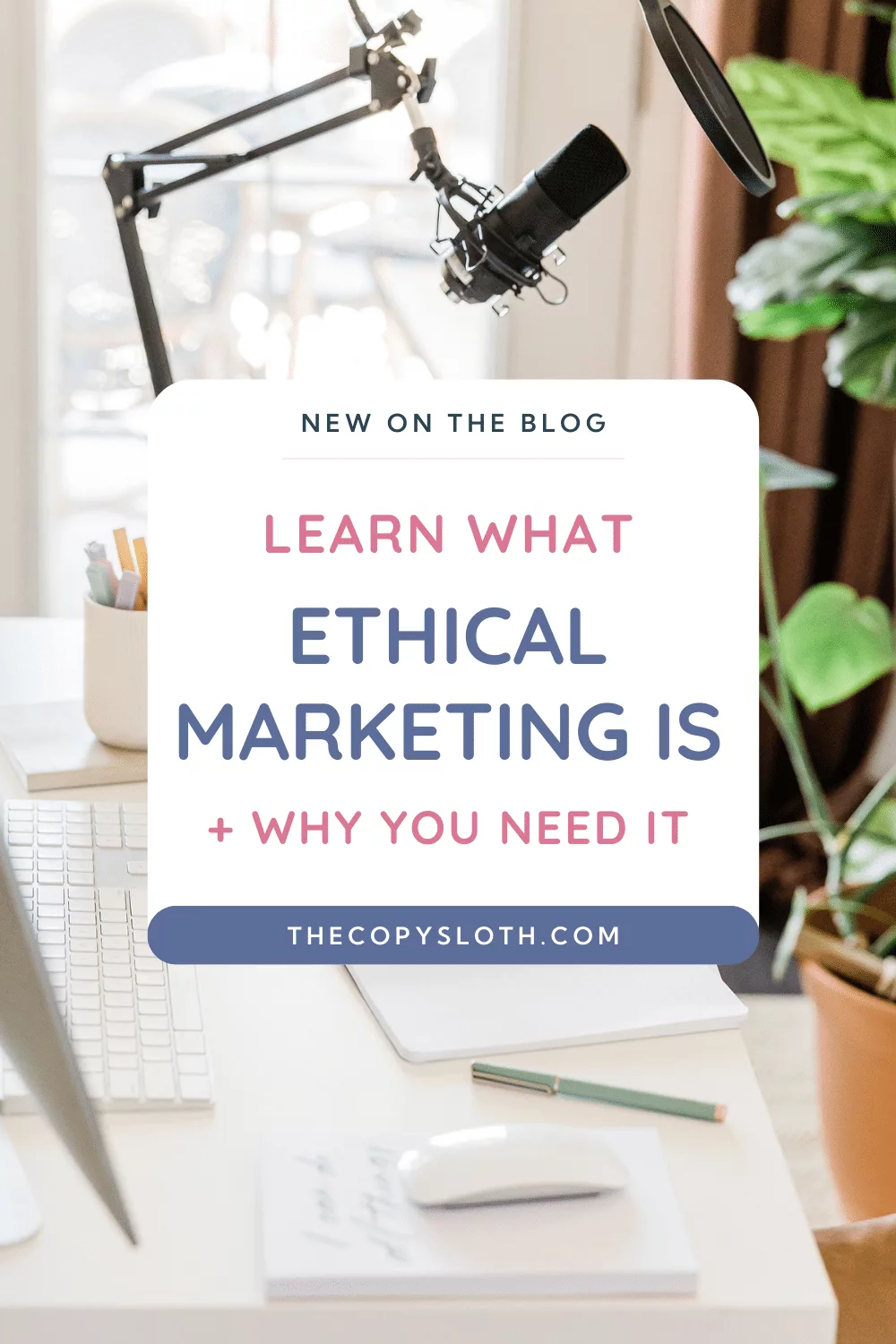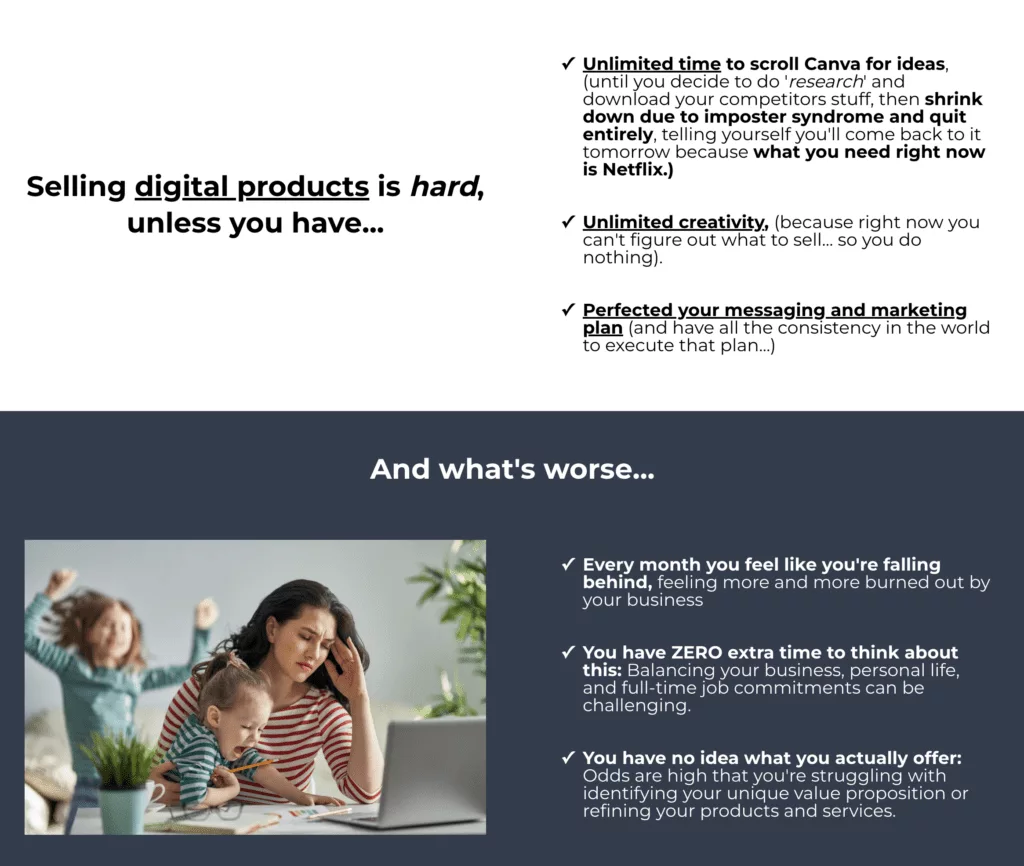This post may contain relevant affiliate links. These give me a small commission at no additional cost to you if you make purchases with them. Please see my disclaimers for more information.
So you’re wondering, “What is ethical marketing?” With all the brow-raising tricks and sketchy business tactics we side-eye online, you should fully understand (and embrace) this movement! You’ll not only serve your audience/buyers better. But you can also learn how to avoid that scammy offer ahead of time. Let’s dive in!

This post is all about answering the question “what is ethical marketing?”.
What’s in the episode
Listen while you read
What is ethical marketing?
Ethical marketing is a tenet (a philosophy) — NOT a strategy. In ethical marketing, we don’t assume authority or trust. We earn it. When you’re an ethical marketer, you understand that what you write affects others.
It’s a practice based on transparent action that keeps or holds online business owners or content creators accountable to their customers and audience. You can also think of it as a LOUD response against the sketchy dude-bro schemes and girl-boss shame we see on social media, sales pages, and ads.
At the core of ethical marketing, you’ll find two main pillars: a complete understanding that your words have a huge impact on people as well as holding respect and space for everyone (even if they’re not buying from you).
Shameful marketing examples
Now that you know what ethical marketing is, let’s talk about what I call shameful marketing. Keep in mind that ‘shameful marketing’ is a grossly simplified term that really encompasses a LOT of tactics that trigger someone’s guilt, shame, or fear OR evoke other strong, negative emotions with the end goal of making a quick buck.
When sales pages employ this style of marketing, they disguise educating someone (a.k.a “value”) with either bloated (or overcomplicated) stretches of reality or hollow problems that don’t really serve their buyers in any meaningful way.
In an effort to keep this example as unharmful as possible, I’ve found two mild examples to help you bridge any uncertainty you may or may not have:
Example 1: subscription membership

So what’s wrong with this sales page example? This course creator:
- 🚩 ASSUMES that you have no idea what you should offer
- 🚩 TRIGGERS (or agitates) a very common guilt in people who feel they fall behind or can’t find balance
- 🚩 IMPLIES that you can’t find success selling digital products without the perfect messaging or unlimited time and creativity
- 🚩 Uses imagery that sends a clear message to mothers who already struggle on the regular with mom shame + guilt
Example 2: free masterclass

In this example, the creator:
- 🚩 GUARANTEES a specific result with a very volatile tool (Facebook ads) like it’s impossible for anyone to fail
- 🚩 CONTRADICTS her terms of use by using language like “fail-proof” that implies a very specific, guaranteed result
To show you what I mean when I say that she contradicts her terms of use website page, here’s a screenshot of a common section in most terms of use policies online. I personally believe your marketing + messaging should match your fine print!

Let me know how either of these shameful marketing examples make you feel or think!
What ethical marketing is not
I’m not saying I don’t write this in some of my content. I’m not perfect. No one ever will be. Ethical marketing isn’t supposed to paralyze you or make you question your whole marketing strategy or sales page copy.
Rather, my mission is to simply make you more aware of the impact your words have. I’m not here to call you out or make you feel lesser than at all! The real motivation here is to show you clear examples of things that could:
- Make your buyers feel a certain (negative) way
- Sell using manipulative marketing tactics
- Land you in a legal gray area
All in all, sales pages like the membership example above are easy bait-and-switch marketing. People find success selling digital products (or selling whatever your products or services are) WITHOUT ever buying into an expensive membership, course, or coach.
The moral nugget I’d love for you to walk away from this post with is simple: Use more empathy in how you market your business. That’s it!
The Copy Sloth Podcast Vibe
Consider this podcast our space to expand the conversation around awful marketing practices that make your eyes roll as much as mine. I’m talking all about:
- Dude-bro gimmicks
- Girl-boss shame
- Anti-corporate insults from entrepreneurs
- Commercial cults (multi-level marketing companies)
- Toxic positivity
- Hustle culture
…all of that and so much more!
Who is Aubrey McShan?
I’m the host of The Copy Sloth Podcast. Around here, you can expect me to call out the unethical online marketing strategies that we’re all so used to seeing — the practices, not the people!
Outside of gabbing on my YouTube channel and this podcast, I’m an email copywriter and introvert marketing blogger. My entrepreneur journey has been quite the ride (more like a rollercoaster if I’m gonna be honest).
When I got laid off from my corporate job in 2020, I really had to figure out ways to ball on a bootstrap. After 2 years of being my own boss, I decided to give corporate another shot. Today, I’m both an entrepreneur and SEO content strategist at a multi-million-dollar e-commerce retailer.
TLDR
Frankly, ethics should have always mattered. Not everyone intentionally uses those slimy strategies and tricky tactics. But let’s be honest, most of us have used them at one time or another.
We’ve almost been conditioned to expect all those awful practices as a standard. So let’s dismantle them and rebuild online marketing together: one blog post, YouTube video, email sequence, or podcast episode at a time. Stick with me, and we’ll inject the ethical back into your marketing strategy.
This post was all about the answering the question “what is ethical marketing?“.


